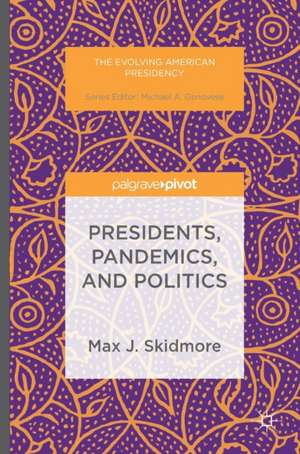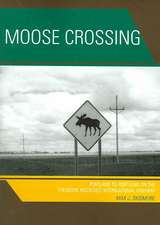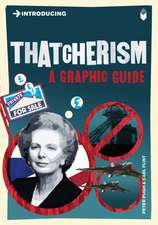Presidents, Pandemics, and Politics: The Evolving American Presidency
Autor Max J. Skidmoreen Limba Engleză Hardback – 27 oct 2016
| Toate formatele și edițiile | Preț | Express |
|---|---|---|
| Paperback (1) | 409.43 lei 6-8 săpt. | |
| Palgrave Macmillan US – 22 iun 2018 | 409.43 lei 6-8 săpt. | |
| Hardback (1) | 415.57 lei 6-8 săpt. | |
| Palgrave Macmillan US – 27 oct 2016 | 415.57 lei 6-8 săpt. |
Din seria The Evolving American Presidency
-
 Preț: 204.96 lei
Preț: 204.96 lei -
 Preț: 227.99 lei
Preț: 227.99 lei - 15%
 Preț: 527.01 lei
Preț: 527.01 lei - 20%
 Preț: 627.74 lei
Preț: 627.74 lei -
 Preț: 384.86 lei
Preț: 384.86 lei -
 Preț: 390.63 lei
Preț: 390.63 lei - 15%
 Preț: 499.43 lei
Preț: 499.43 lei - 8%
 Preț: 582.08 lei
Preț: 582.08 lei -
 Preț: 382.75 lei
Preț: 382.75 lei -
 Preț: 385.62 lei
Preț: 385.62 lei - 18%
 Preț: 898.75 lei
Preț: 898.75 lei -
 Preț: 387.58 lei
Preț: 387.58 lei -
 Preț: 383.93 lei
Preț: 383.93 lei -
 Preț: 381.00 lei
Preț: 381.00 lei -
 Preț: 384.86 lei
Preț: 384.86 lei - 18%
 Preț: 728.91 lei
Preț: 728.91 lei - 15%
 Preț: 587.02 lei
Preț: 587.02 lei -
 Preț: 388.72 lei
Preț: 388.72 lei - 8%
 Preț: 582.08 lei
Preț: 582.08 lei -
 Preț: 358.34 lei
Preț: 358.34 lei - 15%
 Preț: 695.70 lei
Preț: 695.70 lei -
 Preț: 387.75 lei
Preț: 387.75 lei -
 Preț: 386.81 lei
Preț: 386.81 lei -
 Preț: 388.52 lei
Preț: 388.52 lei - 15%
 Preț: 686.65 lei
Preț: 686.65 lei - 15%
 Preț: 580.36 lei
Preț: 580.36 lei -
 Preț: 387.75 lei
Preț: 387.75 lei - 15%
 Preț: 696.50 lei
Preț: 696.50 lei -
 Preț: 385.84 lei
Preț: 385.84 lei -
 Preț: 390.63 lei
Preț: 390.63 lei -
 Preț: 487.19 lei
Preț: 487.19 lei -
 Preț: 385.84 lei
Preț: 385.84 lei -
 Preț: 455.71 lei
Preț: 455.71 lei -
 Preț: 384.31 lei
Preț: 384.31 lei -
 Preț: 389.70 lei
Preț: 389.70 lei -
 Preț: 384.86 lei
Preț: 384.86 lei
Preț: 415.57 lei
Nou
Puncte Express: 623
Preț estimativ în valută:
79.52€ • 83.02$ • 65.81£
79.52€ • 83.02$ • 65.81£
Carte tipărită la comandă
Livrare economică 04-18 aprilie
Preluare comenzi: 021 569.72.76
Specificații
ISBN-13: 9781349949922
ISBN-10: 1349949922
Pagini: 92
Ilustrații: VII, 97 p.
Dimensiuni: 148 x 210 x 8 mm
Greutate: 0.28 kg
Ediția:1st ed. 2016
Editura: Palgrave Macmillan US
Colecția Palgrave Macmillan
Seria The Evolving American Presidency
Locul publicării:New York, United States
ISBN-10: 1349949922
Pagini: 92
Ilustrații: VII, 97 p.
Dimensiuni: 148 x 210 x 8 mm
Greutate: 0.28 kg
Ediția:1st ed. 2016
Editura: Palgrave Macmillan US
Colecția Palgrave Macmillan
Seria The Evolving American Presidency
Locul publicării:New York, United States
Cuprins
I Introduction
Twentieth-Century Successes
A Disturbing Development
The Importance of National, and Presidential, Action
II Pandemic Influenza
Influenza is not to be Taken Lightly
Influenza at its Most Horrendous—So Far
III Misguided Responses to Public Health Emergencies
The Tragedies of Kalaupapa and Carville
The “Magic of the Marketplace,” and Public Health Emergencies
Militant Passivity from the Left Hand, Authoritarianism from the Right
Ideology, Incompetence, but Some Thoughtful Planning
IV Appropriate Responses to Public Health Emergencies
Presidential Action and the San Francisco Earthquake
Presidential Action and Hurricane Betsy
Presidential Action and the Alaskan Earthquake
V President R. Gerald Ford
Vigorous Action to Defend Against a Threatened Pandemic
Fair Game: The Politics of Piling On
VI President Ford’s National Influenza Immunization Program: A Special Case
The Background: Widespread Agreement
The Launching of Ford’s NIIP
Obstacles Emerge
No Pandemic plus Health Risk Must Mean Fiasco: A Confused Discourse
Turning From Talking Points to Analysis: NIIP as a Learning Experience
Assessment of the NIIP
VII Conclusions
Emergency Management
Lessons to Be Learned
Bibliography
Index
Notă biografică
Max J. Skidmore is Curators’ Professor of Political Science and Thomas Jefferson Fellow at University of Missouri-Kansas City, USA.
Textul de pe ultima copertă
This book is an examination of the manner in which American presidents respond to pandemics and other public health crises. Skidmore argues that presidential performance in dealing with emergencies and pandemics varies, but those who are informed, focused, and confident that government can work are most likely to be successful. As an example, Gerald Ford’s “Swine Flu program” is widely derided as incompetent and politically motivated. Closer examination, however, suggests the contrary, demonstrating the potential of government to act quickly and effectively against public health emergencies, even when facing formidable obstacles. The American government has a mixed record ranging from excellent to unacceptable, even counterproductive, in dealing with emergency threats to life and health. Despite ideological arguments to the contrary, however, governments are important to effective responses, and in the American setting, presidential action is essential.
Caracteristici
Examines how presidents from Eisenhower to Obama handled the threat of contagious disease and what lessons can be learned from their responses
Covers not just spontaneous disease outbreaks, but also the challenges that follow natural disasters when sanitation infrastructure has been damaged
Presents an important study for those interested in the presidency, public health, and public administration
Covers not just spontaneous disease outbreaks, but also the challenges that follow natural disasters when sanitation infrastructure has been damaged
Presents an important study for those interested in the presidency, public health, and public administration







